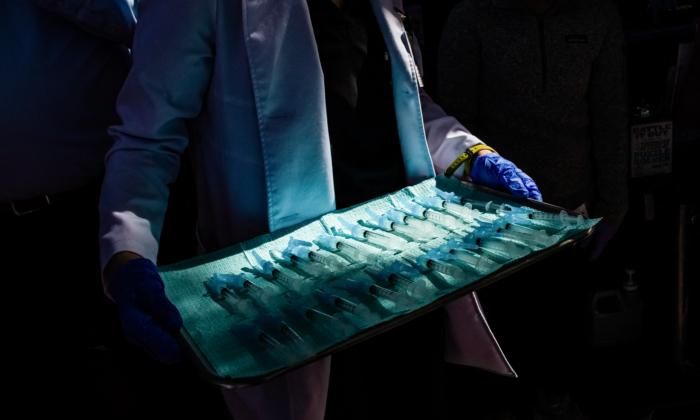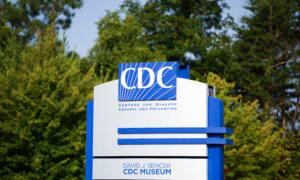
COVID-19 vaccination may have contributed to an increase in deaths from neoplasms like cancer during the 2021–22 pandemic period, according to a recently published study that called for more research on the issue.
The MC/UC cancer death rate ratio “tends to be relatively stable over time,” researchers wrote. While the ratio was “relatively stable” between 2010 and 2019, it jumped in 2020, and continued to rise in 2021 and 2022. “This indicates a break from the existing trend in which people with cancer were increasingly dying of another condition or reason.”
Researchers explained the 2020 jump as being due to COVID-19-related or other negative health effects linked to the pandemic like lockdowns, stress, less exercise, worse food habits, and lack of medical care.
As to the increase in MC/UC cancer death ratio seen in 2021 and 2022, “given the case studies of neoplasms following COVID-19 vaccination cited in the literature, one possible factor could be adverse effects of the COVID-19 vaccines, which were rolled out from 2021 and prioritized for vulnerable groups such as those with cancer,” the study said.
“Additionally, one cannot disregard the possibility of continuous COVID-19 infections or Long COVID being contributors towards increased incidence or severity of cancers.”
Excess UC death rates from neoplasms started in 2021 and “rose substantially” in 2022 for most age cohorts 15 years and above. It was older individuals aged 75 and above that showed the highest increases in UC excess deaths from cancers, with people aged 85 and older the most affected. Excess MC death rates began to rise in 2020 for age groups 35 to 44 and older.
Researchers recommended that “future studies should focus on COVID-19 vaccinated and unvaccinated individuals and whether the vaccination rollout or COVID-19-related conditions such as Long COVID are contributing factors to the ongoing rise in neoplasm-related deaths.”
The authors mentioned some limitations in their analysis. First, the 2022 death rate data from the CDC was provisional, meaning the numbers are subject to potential changes, which could then impact the conclusions made in the study.
Another factor is a likely reduction in cancer screening, diagnostics, and treatments during the pandemic, which could lead to higher cancer deaths in subsequent years, it said. However, this is not expected to be “very impactful” among individuals aged 50 and below.
The study was conducted by two researchers—Yuri Nunes from the Department of Physics at Nova University of Lisbon, Portugal, and Carlos Alegria, a Doctor of Philosophy
Authors declared they received no financial support from any organization for the work, and that there were no other relationships or activities that could have influenced the submitted study.
While the study suggests potential links between COVID-19 vaccines and cancer, other expert groups dismiss such associations.
COVID Vaccine and Cancer Risks
Multiple studies have linked COVID-19 vaccines with the risk of new cancers or worsening existing ones. A May 2023 study found that individuals subjected to repeated mRNA vaccinations and high antigen concentrations may experience increased synthesis of igG4 antibodies that can “promote cancer growth” among susceptible people.“Now I’m seeing the solid tissue cancers at rates I’ve never seen … Patients that were stable, or cancer-free for one, two, five, ten years and their cancer’s back—it’s back with a vengeance and it’s not responding to the traditional therapies,” he said.
A study conducted by microbiologist Kevin McKernan, a researcher who worked on MIT’s Human Genome Project, found that the amount of DNA in COVID-19 vaccines could be 18 to 70 times higher than what top health agencies would set as acceptable limits.
“We encourage the scientific and medical community to urgently evaluate the impact of both COVID-19 and COVID-19 vaccination on cancer biology and tumor registries, adjusting public health recommendations accordingly,” the authors wrote.
The review pointed out that clinical trials of the Pfizer and AstraZeneca vaccines described a “decrease in plasma lymphocytes 6-8 days post-vaccination in 45 percent-46 percent of participants.” Lymphocytes are a type of white blood cell that helps the immune system fight against foreign bacteria and viruses.
Lymphopenia, a condition in which there is an abnormally low count of lymphocytes, “has long been associated with increased cancer incidence and risk of malignancy,” said the review. “Lymphocyte alterations are frequent in patients with cancer and strongly impact prognosis and survival.”
Given that lymphopenia contributes to creating an environment favorable to the progression of cancer, “extreme caution” must be observed when recommending COVID-19 vaccines to cancer patients—“especially those undergoing anticancer treatment.”


No comments:
Post a Comment